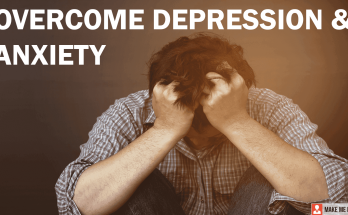Here are 5 Lifestyle Changes to Help Manage Anxiety or Depression
Mental health is just as vital as physical health, yet it is often overlooked, misunderstood, or stigmatized. Two of the most common mental health challenges affecting millions worldwide are anxiety and depression. While these conditions may require professional intervention through therapy or medication, research and clinical evidence consistently show that lifestyle changes can play a significant role in managing and even reducing their symptoms.
Lifestyle changes are powerful tools because they target both the mind and body. They foster resilience, improve mood, stabilize emotions, and enhance overall well-being. However, it’s crucial to understand that lifestyle changes are not quick fixes. They are long-term commitments that gradually build a foundation of mental health stability. In this article, we will explore five evidence-based lifestyle changes that can significantly help manage anxiety and depression. Each section will delve into how the change works, what the science says, and how to implement it practically in your daily life.
1. Prioritize Regular Physical Activity
Why It Works
Exercise is more than just a way to keep your body fit — it’s a natural and powerful antidote to anxiety and depression. Physical activity increases the production of endorphins (the brain’s feel-good neurotransmitters) and promotes the release of serotonin and dopamine, chemicals that play a significant role in mood regulation.
Exercise also reduces the levels of stress hormones like adrenaline and cortisol. Over time, consistent physical activity remodels the brain, especially the hippocampus, an area linked to mood, memory, and learning. Studies show that people who engage in regular exercise have lower rates of depression and anxiety, and those already diagnosed often experience symptom relief.
Scientific Backing
- A study published in the American Journal of Psychiatry found that as little as one hour of exercise per week can prevent 12% of future cases of depression.
- The Harvard Medical School notes that running for 15 minutes a day or walking for an hour reduces the risk of major depression by 26%.
- Aerobic exercise has shown to be equally effective as antidepressants in some individuals with mild to moderate depression.
How to Implement
- Start small: If you’re feeling low or anxious, start with 10 minutes of walking, stretching, or yoga. The key is consistency.
- Choose what you enjoy: Whether it’s dancing, swimming, hiking, or strength training — doing something you like increases the chance of maintaining the habit.
- Incorporate movement into your routine: Use stairs instead of elevators, walk while on phone calls, or take walking meetings.
- Set realistic goals: Aim for 30 minutes of moderate exercise, five times a week — but remember that even short bursts count.
2. Improve Your Sleep Hygiene
Why It Works
Poor sleep and mental health problems are intimately connected. Insomnia is a common symptom of both anxiety and depression. Conversely, lack of quality sleep worsens emotional regulation, increases irritability, reduces stress tolerance, and amplifies the symptoms of these conditions.
Sleep restores brain function and emotional equilibrium. During deep sleep, the brain clears toxins, repairs neural pathways, and regulates hormones, including those that influence mood and stress.
Scientific Backing
- A 2020 review in Sleep Medicine Reviews concluded that improving sleep can lead to significant improvements in depression and anxiety symptoms.
- People with insomnia are 10 times more likely to develop depression and 17 times more likely to suffer from clinical anxiety compared to those who sleep well.
- Research from the University of California, Berkeley found that sleep deprivation intensifies activity in the amygdala (the brain’s fear center), exacerbating anxiety symptoms.
How to Implement
- Establish a consistent sleep schedule: Go to bed and wake up at the same time every day — even on weekends.
- Create a relaxing bedtime routine: Activities like reading, listening to calming music, or gentle yoga can signal your brain it’s time to wind down.
- Limit screen time before bed: Blue light from phones and computers interferes with melatonin production, making it harder to fall asleep.
- Optimize your sleep environment: Keep your bedroom cool, dark, and quiet. Use blackout curtains and consider white noise machines if needed.
- Avoid caffeine and alcohol late in the day: Both can disrupt sleep quality.
3. Adopt a Balanced, Nutrient-Rich Diet
Why It Works
The phrase “you are what you eat” holds especially true when it comes to mental health. The brain is an energy-intensive organ, consuming up to 20% of the body’s calories. A steady supply of high-quality nutrients supports its structure and function. In contrast, a diet high in refined sugars, processed foods, and trans fats contributes to inflammation and oxidative stress, which are linked to depression and anxiety.
The gut and brain are also intricately connected via the gut-brain axis. The gut microbiome (the trillions of bacteria living in our intestines) plays a crucial role in mental health by producing neurotransmitters like serotonin and dopamine. A healthy gut leads to a healthier mind.
Scientific Backing
- The SMILES trial conducted in Australia found that people with moderate to severe depression who adopted a Mediterranean-style diet showed significantly greater improvement compared to those who received only social support.
- Diets rich in omega-3 fatty acids, folate, vitamin D, zinc, and magnesium have been associated with lower rates of depression.
- Emerging research indicates that fermented foods and probiotics (which support gut health) may reduce symptoms of anxiety.
How to Implement
- Eat whole, minimally processed foods: Focus on fruits, vegetables, whole grains, lean proteins, legumes, nuts, and seeds.
- Incorporate healthy fats: Include sources of omega-3s such as salmon, flaxseeds, and walnuts.
- Watch sugar and caffeine intake: Excessive sugar spikes insulin and leads to mood crashes; caffeine can heighten anxiety.
- Stay hydrated: Even mild dehydration can affect mood and concentration.
- Consider supplements: If you suspect deficiencies (common with vitamin D, magnesium, or B vitamins), consult a healthcare provider for blood work and guidance.
4. Practice Mindfulness and Stress Reduction Techniques
Why It Works
Mindfulness is the practice of being fully present in the moment, aware of your thoughts and feelings without judgment. It interrupts the cycle of overthinking — a hallmark of anxiety and depression — and reduces emotional reactivity.
Mindfulness-based practices like meditation, deep breathing, progressive muscle relaxation, and grounding exercises help shift focus from negative thought patterns and promote a sense of calm and control.
Scientific Backing
- A meta-analysis of 47 studies published in JAMA Internal Medicine found that mindfulness meditation can improve symptoms of anxiety, depression, and pain.
- Mindfulness-based cognitive therapy (MBCT) is as effective as antidepressants in preventing depression relapse, according to multiple randomized controlled trials.
- Just 10-20 minutes of daily meditation has been shown to shrink the amygdala and enhance activity in the prefrontal cortex, helping regulate mood and decision-making.
How to Implement
- Start with guided meditations: Apps like Headspace, Calm, or Insight Timer offer beginner-friendly sessions.
- Incorporate breathing exercises: Techniques like 4-7-8 breathing or box breathing can calm the nervous system within minutes.
- Practice gratitude journaling: Writing down 3 things you’re grateful for daily can shift focus from negative to positive thoughts.
- Use mindfulness in daily tasks: Try mindful walking, eating, or even dishwashing — fully immerse yourself in the activity.
- Attend yoga or tai chi classes: These combine movement with mindfulness and have proven benefits for mental well-being.
5. Build and Maintain Supportive Relationships
Why It Works
Human beings are inherently social creatures. Having a strong support network can act as a buffer against stress and emotional struggles. Isolation, on the other hand, often fuels anxiety and deepens depressive symptoms. Emotional support from friends, family, or support groups provides comfort, perspective, and the motivation to keep going.
Meaningful relationships contribute to a sense of belonging and purpose — two critical elements for emotional well-being. Talking things through with a trusted person often reduces the intensity of negative emotions and helps in finding solutions.
Scientific Backing
- Loneliness is a significant risk factor for depression. A study in The Lancet Psychiatry found that loneliness doubled the risk of developing depression in adults.
- Social connection boosts levels of oxytocin — the “bonding hormone” — which lowers stress and improves mood.
- People with strong social relationships are 50% more likely to survive over a given period compared to those with weaker social ties, according to a PLOS Medicine review.
How to Implement
- Reach out regularly: Schedule weekly calls or coffee dates with loved ones, even if you don’t feel like it.
- Join community or interest groups: Volunteering, hobby clubs, or religious groups offer natural opportunities for connection.
- Consider therapy or group support: Support groups — online or in person — provide shared experiences and mutual encouragement.
- Limit toxic relationships: It’s okay to set boundaries with people who drain your energy or cause distress.
- Be vulnerable: Open up when you’re struggling. Often, the act of sharing can lighten your emotional burden.
Conclusion: Mental Health is a Journey, Not a Destination
Managing anxiety and depression is a complex process that often requires a multi-faceted approach. While medications and therapy are vital for many, lifestyle changes play an equally important role in fostering mental wellness. Exercise, sleep, nutrition, mindfulness, and strong relationships are not just good habits — they are foundational pillars for emotional resilience.
Change doesn’t happen overnight. You don’t need to master all five areas immediately. Choose one or two changes that feel most accessible to you right now. Build consistency, celebrate small wins, and gradually expand your efforts. Over time, these healthy habits can create a powerful, lasting shift in your mood, mindset, and quality of life.
If you or someone you love is struggling with anxiety or depression, know that help is available. Don’t hesitate to reach out to a licensed therapist, mental health professional, or crisis support line. You are not alone, and recovery is possible — often beginning with just one small, intentional step.


